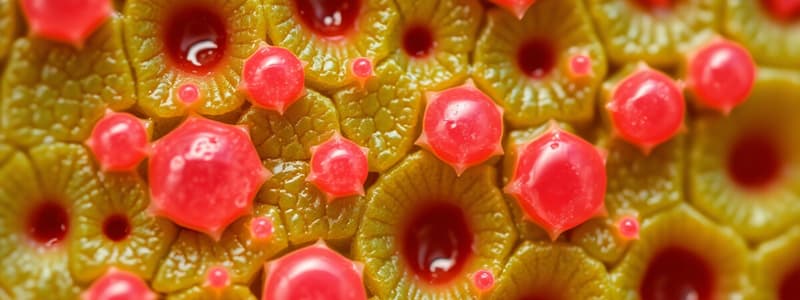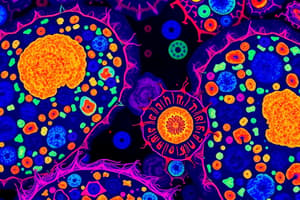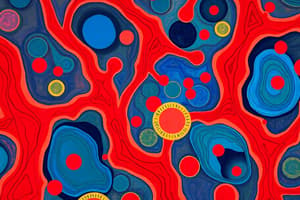Podcast
Questions and Answers
What is the primary function of the epidermal cells in plants?
What is the primary function of the epidermal cells in plants?
- Assist in cellular respiration for growth
- Offer protection from water loss and pathogens (correct)
- Transport nutrients throughout the plant
- Facilitate photosynthesis within the leaves
Which type of epidermal cells are responsible for regulating the exchange of gases in leaves?
Which type of epidermal cells are responsible for regulating the exchange of gases in leaves?
- Pavement cells
- Trichomes
- Basal cells
- Stomatal guard cells (correct)
How do epithelial cells predominantly arrange themselves?
How do epithelial cells predominantly arrange themselves?
- In a scattered, irregular pattern
- In spherical clusters with no gaps
- In layers of contiguous cells (correct)
- In a single dense mass
What is the main characteristic of animal cells compared to plant cells?
What is the main characteristic of animal cells compared to plant cells?
What describes simple cuboidal epithelial cells best?
What describes simple cuboidal epithelial cells best?
Which type of connective tissue cell is involved in oxygen transport?
Which type of connective tissue cell is involved in oxygen transport?
Which of the following epithelial tissues is characterized as pseudo-stratified columnar?
Which of the following epithelial tissues is characterized as pseudo-stratified columnar?
What distinguishes stratified squamous epithelial cells?
What distinguishes stratified squamous epithelial cells?
What occurs during the G1 phase of interphase?
What occurs during the G1 phase of interphase?
What is produced during meiosis?
What is produced during meiosis?
Which phase of mitosis sees the sister chromatids breaking apart?
Which phase of mitosis sees the sister chromatids breaking apart?
In which stage of mitosis do chromosomes align at the metaphase plate?
In which stage of mitosis do chromosomes align at the metaphase plate?
Which of the following correctly describes the process of Meiosis 1?
Which of the following correctly describes the process of Meiosis 1?
What is the main function of cytokinesis?
What is the main function of cytokinesis?
Which phase precedes Metaphase in mitosis?
Which phase precedes Metaphase in mitosis?
What distinguishes meiosis from mitosis?
What distinguishes meiosis from mitosis?
What is the primary function of plastids in plant cells?
What is the primary function of plastids in plant cells?
Which pigment is essential for the process of photosynthesis in plants?
Which pigment is essential for the process of photosynthesis in plants?
Where do the light-dependent reactions of photosynthesis occur?
Where do the light-dependent reactions of photosynthesis occur?
What type of energy is converted during the light-dependent reactions?
What type of energy is converted during the light-dependent reactions?
Which compounds are produced as a result of photosynthesis?
Which compounds are produced as a result of photosynthesis?
What is chlorophyll's role in photosynthesis?
What is chlorophyll's role in photosynthesis?
Which process contributes to plant growth by utilizing light energy?
Which process contributes to plant growth by utilizing light energy?
What happens during telophase 1 of meiosis?
What happens during telophase 1 of meiosis?
What is the relationship between chloroplasts and cyanobacteria?
What is the relationship between chloroplasts and cyanobacteria?
Which statement correctly describes what occurs during prophase 2 of meiosis?
Which statement correctly describes what occurs during prophase 2 of meiosis?
What is a key difference between meiosis and mitosis regarding chromosome behavior?
What is a key difference between meiosis and mitosis regarding chromosome behavior?
What occurs during the metaphase II stage of meiosis?
What occurs during the metaphase II stage of meiosis?
In which phase does the DNA synthesis checkpoint occur?
In which phase does the DNA synthesis checkpoint occur?
What is the main consequence of crossing over that occurs during meiosis?
What is the main consequence of crossing over that occurs during meiosis?
What happens at the cell growth checkpoint (G1)?
What happens at the cell growth checkpoint (G1)?
What is the primary role of cytokinesis?
What is the primary role of cytokinesis?
What defines the process of osmosis?
What defines the process of osmosis?
Which characteristic is required for molecules to undergo simple diffusion?
Which characteristic is required for molecules to undergo simple diffusion?
What role do glycoproteins play in facilitated diffusion?
What role do glycoproteins play in facilitated diffusion?
Which of the following statements about carbohydrates is correct?
Which of the following statements about carbohydrates is correct?
What is a primary function of lipids in biological systems?
What is a primary function of lipids in biological systems?
How are proteins fundamentally structured?
How are proteins fundamentally structured?
What is the significance of carbon's ability to form multiple bonds?
What is the significance of carbon's ability to form multiple bonds?
What are amino acids primarily known for?
What are amino acids primarily known for?
Flashcards are hidden until you start studying
Study Notes
Epidermal Cells
- External cells of plants providing protection against water loss and pathogens such as fungi.
- Closely packed with minimal intracellular spaces, enhancing their protective function.
- Covered by a waxy cuticle, which helps to reduce water loss.
- Found on plant stems, leaves, roots, and seeds.
Types of Epidermal Cells
- Pavement Cells: Help maintain the plant's internal temperature.
- Stomatal Guard Cells: Regulate water availability and manage gas exchange by opening and closing stomata through turgor pressure.
- Trichomes: Also known as epidermal hairs, they trap and deter animal predators, playing a significant role in plant defense.
Animal Cells
- Generally smaller than plant cells and characterized by irregular shapes due to the absence of a cell wall.
Epithelial Tissue
- Comprises layers of contiguous cells lining organ surfaces and cavities.
- Found covering the external body surface, lining interior tracts like the respiratory and gastrointestinal systems, and enclosing spaces like blood vessels.
Types of Epithelial Cells
-
According to Layers:
- Simple Epithelia: One cell layer thick.
- Stratified Epithelia: Multiple layers with at least one anchored to a basal membrane.
-
According to Shape:
- Cuboidal: For secretion.
- Simple Columnar: Brick-shaped, involved in secretion and absorption.
- Simple Squamous: Plate-like, facilitating material exchange through diffusion.
- Stratified Squamous: Multilayered for protection, regenerates quickly.
- Pseudo-stratified Columnar: Appears multilayered but is actually a single layer; lines the respiratory tract and often has cilia.
Connective Tissue Cells
- Blood: Comprises plasma, erythrocytes (RBCs for oxygen transport), leukocytes (WBCs for defense), and platelets for clotting.
Cell Cycle Stages
- Interphase: Comprises G1, S, and G2 phases, wherein cells grow, replicate DNA, and prepare for division.
- G1 Phase: Prepares cell for division through metabolic changes.
- S Phase: DNA synthesis occurs; each chromosome doubles, forming sister chromatids.
- G2 Phase: Prepares cytoplasmic materials necessary for mitosis.
Cell Division Processes
- Mitosis: The process of aligning and separating duplicated chromosomes into two identical daughter cells.
- Meiosis: A two-step division process that produces haploid gametes with genetic variation.
- Meiosis 1: Involves homologous chromosomes separating.
- Meiosis 2: Sister chromatids separate, leading to four genetically diverse daughter cells.
Cellular Division Phases
- Mitosis Phases: Prophase, Prometaphase, Metaphase, Anaphase, Telophase.
- Meiosis 1 & 2: Each with distinct phases including Prophase, Metaphase, Anaphase, and Telophase.
Cell Cycle Checkpoints
- G1 Checkpoint: Assesses cell size and protein synthesis before synthesis phase.
- S Checkpoint: Verifies correct DNA replication before moving to mitosis.
- M Checkpoint: Ensures mitosis is complete before cell division.
Transport Mechanisms
- Simple Diffusion: Small, nonpolar molecules passing through membranes.
- Osmosis: Movement of water across a semipermeable membrane from high to low concentration.
- Facilitated Diffusion: Utilizes protein channels to assist molecules in crossing membranes.
Biological Molecules
- Carbon Bonding: Carbon's tetravalency allows diverse molecular structures crucial for life.
- Carbohydrates: Polymers made of repeating monomers, vital for energy and structural purposes.
- Lipids: Non-polar molecules for energy storage and cellular functions, not formed through polymerization.
- Proteins: Diverse, large macromolecules made of amino acids; perform various biological functions.
Plant Organelles
- Chloroplasts: Site of photosynthesis; contain chlorophyll, which captures light energy.
- Plastids: Involved in food manufacture and storage, contributing to plant metabolism.
Photosynthesis
- Process converting light energy into chemical energy, producing oxygen and organic compounds.
- Light-dependent Reactions: Occur in thylakoid membranes, converting sunlight into chemical energy (NADPH and ATP).
Studying That Suits You
Use AI to generate personalized quizzes and flashcards to suit your learning preferences.




